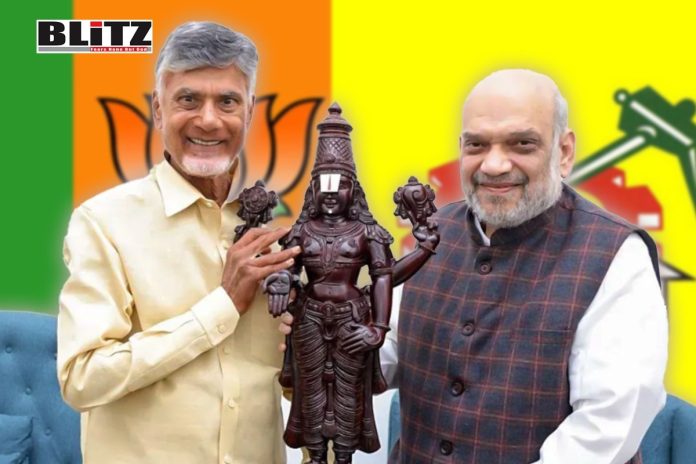The complex web of Indian politics has been witnessing formation of alliances within parties with the expectation of getting better response from the voters. The recent decision by the Telugu Desam Party (TDP) to join forces with the Bharatiya Janata Party (BJP) has sent ripples across the political spectrum, heralding a strategic realignment ahead of the forthcoming Lok Sabha elections. This alliance, poised to reshape the political landscape, bears significant implications for both parties, presenting a win-win scenario in their quest for electoral dominance.
The genesis of this alliance lies in the BJP’s ambitious pursuit of securing over 400 seats in the Lok Sabha elections. With the TDP and the Jana Sena Party (JSP) now part of the National Democratic Alliance (NDA), the BJP’s electoral arithmetic receives a substantial boost. Led by BJP national president Jagat Prakash Nadda, TDP president N. Chandrababu Naidu, and JSP president Pawan Kalyan, this coalition signals a formidable force poised to challenge existing political equations.
Strategically, the BJP is poised to leverage the TDP’s strong presence in Andhra Pradesh, where it plans to contest 17 Lok Sabha seats and a substantial number of Assembly seats. This strategic deployment highlights the BJP’s acknowledgment of the TDP’s formidable regional influence and its capacity to enhance the NDA’s footprint in southern India, an area traditionally less receptive to the BJP. By strategically allocating resources and forging alliances with regional parties like the TDP, the BJP aims to strengthen its position and expand its political sway in this crucial region.
In the intricate game of electoral arithmetic, every seat counts. The BJP’s decision to forge an alliance with the TDP not only expands the NDA’s reach but also strengthens its position vis-à-vis the opposition, particularly the Congress. By thwarting the Congress’s ambitions in the south, the BJP aims to prevent the latter from reaching the critical threshold of 100-125 Lok Sabha seats, thereby consolidating its own electoral advantage.
Crucially, the BJP-TDP alliance represents a convergence of interests driven by pragmatic considerations rather than ideological fervor. Despite their differences and the TDP’s earlier departure from the NDA in 2018, both parties have recognized the strategic imperatives of collaboration in the current political landscape. This pragmatic approach underscores their shared goal of maximizing electoral gains and leveraging each other’s strengths.
Behind the curtains, pivotal figures shaping this alliance, such as Home Minister Amit Shah and Nara Lokesh, the son of Chandrababu Naidu, have diligently crafted the intricacies of collaboration. The upcoming joint rally, set to showcase Prime Minister Narendra Modi alongside Chandrababu Naidu and Pawan Kalyan, epitomizes the cohesion and determination of the coalition. This event is poised not only to energize support within Andhra Pradesh but also to resonate beyond its borders. It symbolizes a unified front, meticulously engineered by astute strategists, aiming to mobilize a broad base of support and secure a formidable position in both the state and national political landscape.
For the TDP, this alliance represents a strategic lifeline amidst challenging political terrain. With the party out of power both at the state and central levels for five years, another electoral setback would have had far-reaching repercussions. By aligning with the BJP, the TDP seeks to rejuvenate its electoral fortunes and safeguard its interests against perceived political vendettas.
The perceived “Modi wave” and the promise of a stronger central government resonate with Chandrababu Naidu and his supporters, offering a shield against what they perceive as a hostile state government led by Y. Jagan Reddy. The BJP’s perceived neutrality in Andhra Pradesh politics presents a strategic advantage for the TDP, deflecting anti-incumbency sentiments and positioning the alliance as a credible alternative.
Furthermore, the BJP’s expansion into southern states, facilitated through its alliance with Chandrababu Naidu, carries significant ramifications for regional politics. Capitalizing on Naidu’s substantial political clout in South India, the BJP seeks to broaden its reach beyond Andhra Pradesh, thereby potentially reshaping electoral dynamics in states such as Telangana and Tamil Nadu. This strategic collaboration not only strengthens the BJP’s foothold in the region but also sets the stage for heightened political maneuvering and competition across southern India.
However, challenges abound on this political odyssey. The BJP’s lackluster performance in Andhra Pradesh, evidenced by the loss of deposits on all contested seats in the 2019 Assembly elections, underscores the uphill battle that lies ahead. Winning over the electorate’s trust and overcoming entrenched regional dynamics will require astute political maneuvering and grassroots mobilization.
The alliance between the BJP and TDP signifies a mutually beneficial partnership rooted in strategic imperatives and electoral pragmatism. As the political terrain undergoes constant transformation, this alliance emerges as a catalyst poised to reshape electoral trajectories and redefine power dynamics. With the looming specter of the Lok Sabha elections, attention converges on this potent coalition as it steers through the turbulent currents of Indian politics. Its potential to influence outcomes and navigate the complexities of the electoral arena garners widespread anticipation and scrutiny across the nation.




